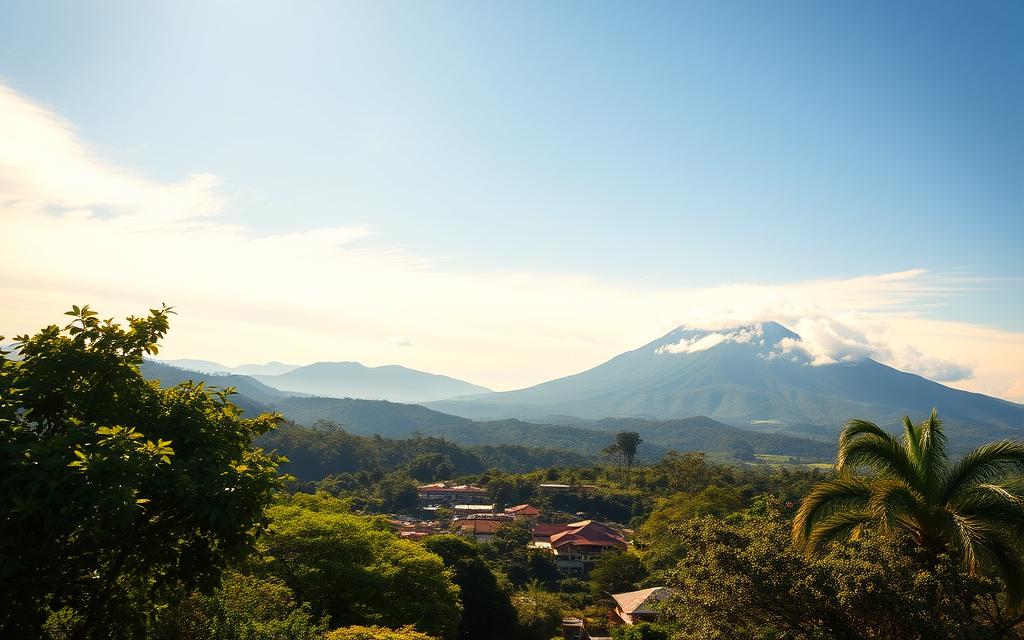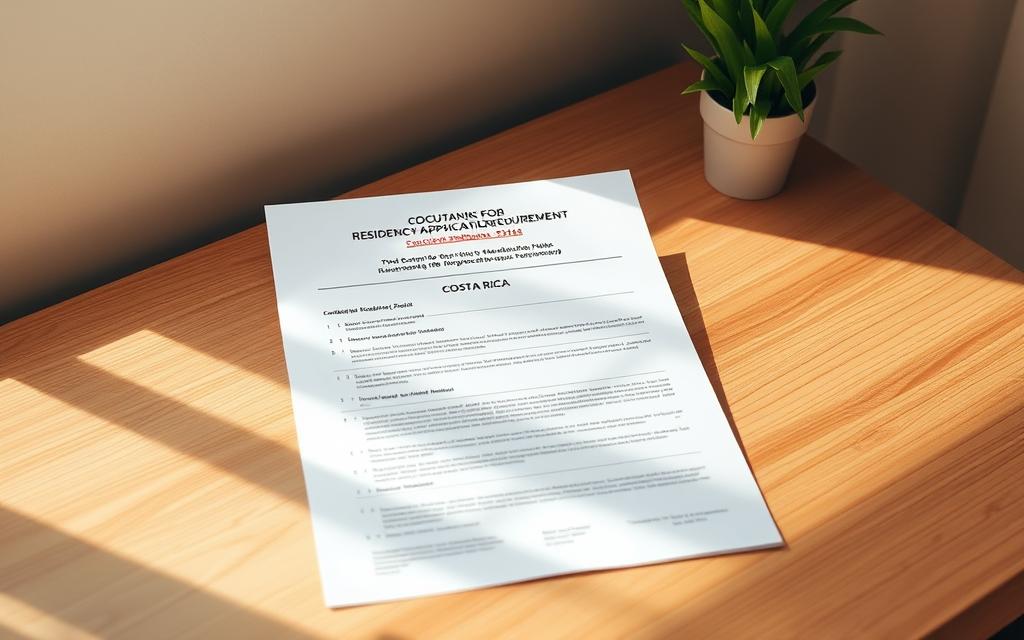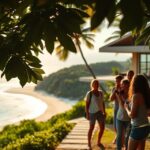How Much Income is Needed for Costa Rica Retirement Residency?

Did you know that Costa Rica’s Pensionado visa requires just $1,000 per month in pension income? This is one of the lowest financial thresholds globally for retirees seeking residency. With its stunning natural beauty, mild climate, and welcoming culture, Costa Rica has become a top destination for expats looking to enjoy a better quality of life.
The Pensionado program is particularly appealing, offering clear income requirements and numerous benefits. Whether you’re drawn to the lush rainforests, pristine beaches, or vibrant communities, Costa Rica provides an ideal setting for a fulfilling retirement. This article will guide you through the application process, documentation, and comparisons among residency options, helping you make an informed decision.
Exploring the lifestyle and fiscal benefits of living in Costa Rica can open up new opportunities. With affordable living costs and a supportive environment, many retirees find it easier to manage their finances while enjoying a relaxed pace of life. Let’s dive into the details to help you understand what it takes to make this dream a reality.
Understanding Costa Rica's Retirement Landscape

Costa Rica offers a variety of residency pathways tailored to different lifestyles and financial situations. Whether you’re a retiree or an investor, the country provides clear options to suit your needs. Understanding these choices is essential for making an informed decision.
Overview of Residency Options
The Pensionado program is popular among retirees, requiring a monthly income of $1,000 from a pension or retirement fund. For those without a pension, the Rentista visa is an alternative, demanding a steady monthly income of $2,500 or a one-time deposit of $60,000. Investors can opt for the Inversionista program, which requires a minimum investment of $150,000 in approved businesses or properties.
Each program has specific documentation requirements, such as a pension letter, birth certificate, and criminal record. These documents must be apostilled and translated into Spanish. The application process typically takes 18-24 months, so planning ahead is crucial.
Benefits of the Costa Rican Lifestyle
This country is known for its stable democracy, natural beauty, and friendly culture. Retirees enjoy a relaxed pace of life, surrounded by lush rainforests and pristine beaches. The cost of living is affordable, with healthcare services being both high-quality and inexpensive.
Expat communities thrive here, offering a supportive environment for newcomers. The country’s safety and welcoming atmosphere make it an ideal destination for retirees seeking a vibrant new chapter in life. Understanding the requirements and benefits of each residency option ensures a smooth transition to this beautiful country.
How much income is needed for Costa Rica retirement residency?
Meeting the financial criteria for residency in Costa Rica is straightforward with the Pensionado program. This option requires a stable monthly income of $1,000 from a pension or retirement fund. It’s one of the most accessible pathways for retirees seeking to become residents.
Financial Requirements for the Pensionado Program
The primary requirement is demonstrating a consistent monthly income of $1,000. This can come from a pension, social security, or other retirement funds. Official documents, such as pension letters or social security statements, are necessary to verify this income.
Applicants must maintain this income level for at least two years to meet renewal conditions. This ensures long-term financial stability for residents. The clear guidelines of the application process make it easier to plan and prepare.
Currency Considerations and Combining Income Sources
If your income is not in USD, currency conversion rates must be considered. The amount should meet the $1,000 threshold after conversion. Combining multiple income sources, such as pensions and investments, can also help meet the requirement.
Understanding these financial details is crucial for a smooth transition. For more insights into the legal requirements, visit our guide on legal requirements for residency in Costa.
This program offers significant benefits, including access to affordable healthcare and a relaxed lifestyle. With proper planning, retirees can enjoy their new life in Costa Rica without financial stress.
Documenting Your Residency Application Requirements

Preparing the right documents is a critical step in securing your residency in Costa Rica. Proper certification and translation of these papers ensure a smooth application process. Let’s explore the essential requirements and tips to help you get started.
Essential Documentation and Certification Tips
To apply for residency, you’ll need several key documents. These include a birth certificate, pension letter, and police clearance certificate. Each document must be apostilled or consularized to meet Costa Rican legal standards.
Translation into Spanish is also mandatory. Certified translators can help ensure your papers are accurate and compliant. Proper preparation of these documents is crucial to avoid delays in the application process.
Proof of income is another vital requirement. For the Pensionado program, this means demonstrating a stable monthly income of $1,000 per month. Official pension letters or social security statements are typically used to verify this amount.
For more details on the legal requirements, visit our guide on legal requirements for residency in Costa Rica. Ensuring all documents are in order before submitting your application will save time and effort.
By following these steps, you can confidently prepare your residency application. Proper documentation is the foundation of a successful transition to living in Costa Rica.
Navigating the Application Process and Timeline

Navigating the residency application process in Costa Rica involves clear steps and careful preparation. Understanding the timeline and requirements ensures a smooth experience for applicants and their families. Let’s break down the key aspects to help you stay on track.
Step-by-Step Application Guidelines
The first step is gathering all necessary documents. These include a birth certificate, pension letter, and police clearance. Each document must be apostilled and translated into Spanish by a certified translator.
Next, submit your application at the nearest consulate or immigration office. Ensure all paperwork is complete to avoid delays. Applicants have 180 days to submit their documents, with an option to extend this period once for a fee.
Maintaining a steady pension income throughout the process is essential. This demonstrates financial stability and meets the program’s requirements. Proper preparation and attention to detail can significantly speed up the process.
Insights on Approval Timelines and Family Inclusion
The approval process typically takes between 18 and 24 months. During this time, applicants and their families are allowed to reside in Costa Rica. This flexibility makes the transition easier for everyone involved.
Family members can be included in the application, provided their documents are also prepared correctly. This includes birth certificates, marriage certificates, and clean criminal records for those over 12 years old.
For more detailed guidance, visit our step-by-step guide on applying for the Pensionado. Following these steps ensures a seamless experience for every person involved.
Comparing Residency Options: Pensionado, Rentista, and Investor
Costa Rica provides distinct residency pathways tailored to diverse financial goals. Whether you’re a retiree, investor, or seeking stable income, understanding the differences between these programs is essential. Let’s explore the Pensionado, Rentista, and Investor options to help you make an informed decision.
Key Differences and Eligibility Criteria
The Pensionado program is ideal for retirees with a steady pension or social security income. It requires proof of at least $1,000 per month. This visa is popular for its simplicity and affordability.
The Rentista program suits those with unearned income, such as investments or annuities. Applicants must show $2,500 per month or a $60,000 deposit. This option is flexible for those without a pension.
The Investor program is designed for individuals willing to invest $150,000 in local businesses or properties. It’s a great choice for those looking to contribute to the economy while securing residency.
Maintaining Residency and Renewal Considerations
All programs require proof of financial stability during the application and renewal process. For the Pensionado and Rentista visas, this means maintaining the required income levels annually.
Spouses and dependents can be included in the application, provided their documents are submitted correctly. This makes it easier for families to relocate together.
Renewal involves submitting updated proof of income and ensuring compliance with program requirements. Staying organized and prepared ensures a smooth renewal process.
Financial Planning and Living Expenses in Costa Rica
Planning your finances is a key step to enjoying a comfortable life in Costa Rica. The country offers an affordable cost of living, making it an attractive destination for retirees and investors alike. Understanding the expenses and budgeting wisely ensures a stress-free transition to this beautiful country.
Budgeting for a Comfortable Retirement
The cost of living in Costa Rica is significantly lower compared to the United States and Canada. Rent, utilities, and transportation are affordable, allowing retirees to stretch their monthly income further. For example, a furnished two-bedroom apartment averages around $750 per month, while utilities like water and electricity are budget-friendly.
Food costs are also reasonable, with fresh produce available at local farmers' markets for $20-30 per month. Dining out at local restaurants, known as "sodas," costs between $6 to $8 per meal. These savings contribute to a high quality of life per year, making it easier to enjoy the country’s natural beauty and vibrant culture.
Healthcare is another advantage, with the national system, "caja," offering affordable coverage. Monthly fees are based on income, providing access to free medical services after enrollment. This ensures retirees can maintain their health without financial strain.
For those considering residency in Costa Rica, careful budgeting is essential. A single person can live comfortably on $1,600 to $2,000 per month, while couples may need $2,500 to $3,000. These figures include housing, food, transportation, and entertainment, ensuring a balanced and enjoyable lifestyle.
By planning ahead and leveraging lower costs, retirees and investors can make the most of their time in Costa Rica. For more insights, explore our guide on residency in Costa Rica and discover how to achieve financial peace of mind in this tropical paradise.
Conclusion
Securing residency in Costa Rica offers a sustainable pathway to a fulfilling lifestyle. The Pensionado program, with its $1,000 monthly pension requirement, provides a clear and accessible option for retirees. Proper documentation, including proof of income and certified translations, ensures a smooth application process.
The benefits of residency are substantial, from affordable healthcare to a vibrant expat community. Whether you choose the Pensionado, Rentista, or Investor program, each type of visa caters to different financial goals. Consulting with immigration experts and reviewing government guidelines can help you navigate the process effectively.
While the journey to permanent residency may take up to three years, the rewards are worth the effort. We encourage you to carefully review all details before starting your residency application. For more insights, explore our guide on Rentista visa holders and take the first step toward your new life in Costa Rica.


